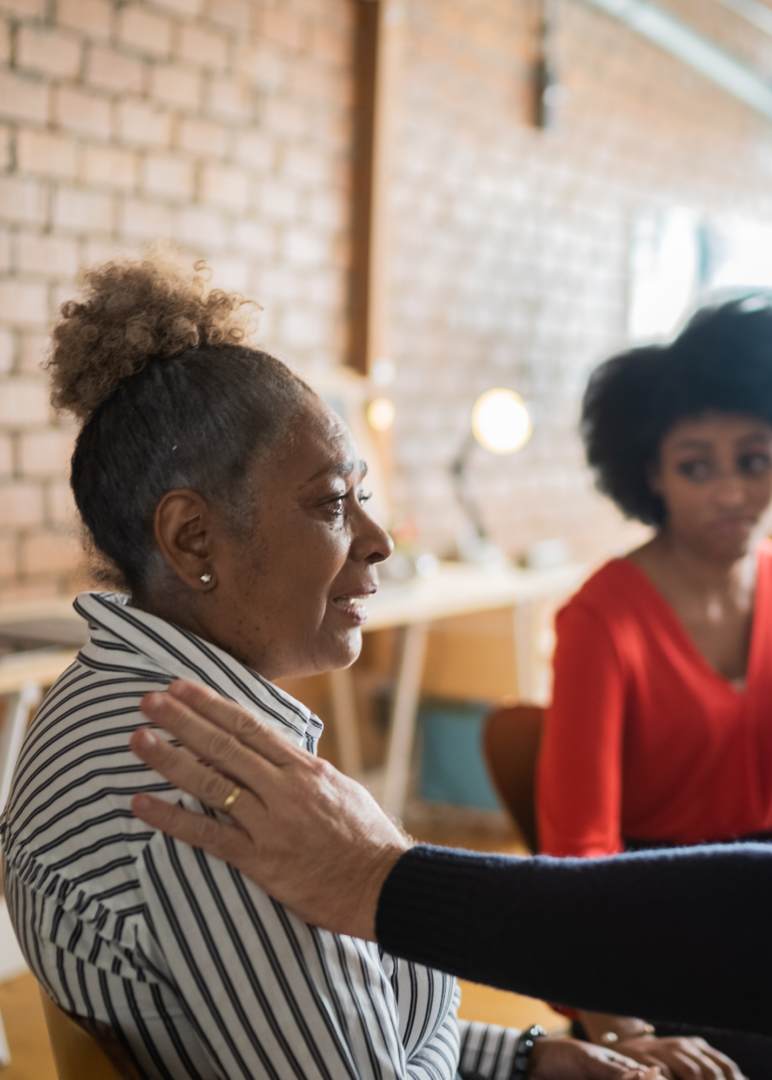Everyone needs a community to share things with; often, your community contains your closest friends or your family. But sometimes, we don’t feel comfortable sharing our struggles or issues within our inner circle. That’s where group therapy comes in a chosen community where you can express your experiences with uncomfortable topics, mental health or otherwise.
What is Group Therapy?
Group therapy is a small gathering of people going through similar issues and looking to improve their situation. You meet regularly to talk and explore their feelings, thoughts, and experiences with one another Groups are facilitated by one or two professionals with expertise in the topic of discussion. These sessions often last for one to two hours.
Not all groups cover the same topics, and many have different approaches.
For example, some groups involve a group therapist providing psychoeducational material through instruction, similar to a teacher. While others are process-oriented, allowing the group therapist to lead the discussion while taking the role of facilitator. Thus, allowing more engagement and sharing between members.
It offers a secure and encouraging setting in which you can talk about your experiences, get feedback on those experiences, and gain new insights into the patterns of behavior and cognition you exhibit.
So, why would anyone tell a group of strangers about their problems? Didn’t your grandma teach you that what happens in the house, stays in the house?
Let’s consider the benefits of shedding the secrecy and joining group therapy.

Benefits of Group Therapy
Although attending group therapy may be intimidating to start, the benefits of having the support of others will hopefully outweigh any initial discomfort. In addition, being around others who can empathize and share similar issues can help you to manage your challenges more efficiently.
Let’s look at some of the reasons you should consider going to group therapy:
There Are No Expectations
Many people are afraid to speak to others about their issues in a world that still struggles to understand mental health. Therefore, expressing your thoughts and emotions in the group might be easier. In group therapy, the group therapist creates a safe atmosphere allowing you to speak without worrying about how you might be perceived or anyone trying to change your perspective.
Group therapy allows you to articulate your feelings and assert your needs without being concerned with judgment.
Not having to put on pretenses can build self-confidence and improve one’s self-image.
Enhanced Sense of Self
You can gain insight into your patterns of behavior and cognition through participation in group therapy, which allows you to see how you interact with others.
You’ll also benefit from increased self-esteem and confidence from receiving positive feedback and support from other group members. You can develop a healthier sense of self the concepts you grow to understand and accept are reinforced by the group.
A Safe and Confidential Setting
You can talk freely about your experiences and not worry about being judged because the group setting is secure and private.
The therapist ensures that the group’s conversations are helpful and considerate. They also require all members to keep their talks about each other’s experiences confidential. That means is a secret, and no you can’t spill the tea!

Group Therapy Offers Mutual Support
Members are encouraged to share their thoughts, feelings, and struggles. Therefore, listening to others provide a broader perspective on a similar situation as yours helps you better problem-solve. Plus, it can help motivate members to obtain wellness by observing how others have achieved it themselves.
One of the most rewarding experiences in group therapy is forming a close-knit community with others who share similar situations in a supportive and non-judgmental environment. Just having the comfort and support of others can help to build healthy and trusting relationships. Supporting others is also very gratifying and being there to comfort others in need rewards both the person giving and receiving support.
Members Can Relate to One Another
Shared experiences are some of the most powerful experiences.
Many people feel very alone when struggling with a mental health condition and often think nobody understands what they’re going through. However, sometimes the issue is that we don’t have a supportive environment or feel comfortable disclosing to those close to us. Fortunately, attending group therapy allows us to see how others share similar experiences or issues.
Listening to other group members share their difficulties can be a validating experience and help you realize you are not alone. Also, the fact that others can relate and empathize provides a sense of empowerment and fortitude you may not have achieved on your own.
You Can Practice Your Communication Skills
“I want to improve my ability to communicate” or some other version of this statement is a common goal clients share when starting therapy.
Group therapy offers you the chance to practice and enhance your communication skills through activities such as active listening, expressing thoughts and feelings, and giving and receiving feedback. These are transferable skills that can be utilized in a variety of contexts, including both personal and professional interactions. It is impactful to have engagement among members who might have had little quality social interaction or otherwise isolated themselves.
Members can also gain skills by listening to and observing the engagement of others.
Group Therapy Helps with Isolation
Attending group therapy allows you to interact with others in a space where they will learn how to communicate their thoughts and feelings.
Group participation can also enhance communication and help build trust. For example, a group therapist may use specific activities to help members learn a little bit about each other informally. Or they may participate in other group activities to assist in sharing and creating community.

Is Group Therapy Right for You?
Attending group therapy can be intimidating. Whether you fear meeting new people, not knowing what to expect, or how it might impact their life. Still, the benefits of group counseling are numerous.
Interacting with other members and communicating in groups helps build the social connections that allow us to heal and move forward. Learning to use your voice builds self-confidence. And listening to others enables you to learn new skills. Group therapy can improve your coping skills in ways you might not have thought otherwise.
The Takeaway
Group therapy is a highly effective form of psychotherapy that provides a variety of advantages over other forms of treatment. It offers a supportive atmosphere, possibilities for personal growth, and the possibility of connecting with those who are going through struggles comparable to yours.
People come in with mental health concerns they wish to improve. Therefore, sharing a similar group dynamic allows people to feel supported, build coping skills, and learn how to achieve their goals.
At Simplicity Psychotherapy, we use group therapy to help you discover the support you need to heal and grow, regardless of whether you are battling issues related to your mental health, difficulties in your relationships, or any other type of challenge.
We Offer Therapy Groups in our Atlanta Office and Online
anxious. black. female.
A semi-structured therapy group where Black women come together to identify, address, and manage their anxiety. Members will learn to work with their anxious minds so that they can focus on living richer and more meaningful lives. The group will participate in a series of interactive discussions and exercises geared toward developing daily mindfulness practices.
a.b.f. offers a a supportive and understanding space specifically tailored to the experiences and needs of Black women dealing with anxiety. Join a unique environment where you can openly discuss your challenges, share coping strategies, and receive guidance from trained therapists.
Taboo Truths Women’s Group
Black women ages 25 to 45 are more likely to experience consistent stress AND not talk about it. This is a safe space for Black women to discuss uncomfortable topics without judgment. Come and explore your unique experiences as a Black Woman including self-esteem, racial identity, relationships, personal power, body image, finding balance, career, academics, family dynamics and anything else important to you. Groups are intimate and space is limited.
Ready to Take Your Healing Journey to the Next Level and Discover the Power of Group Therapy in Atlanta, GA?
If you are ready to shred the secrecy and build up your supportive community, you could benefit from group therapy. At Simplicity Psychotherapy, we ensure that the support groups stay intimate so that you can get the most out of meetings. If you are interested in signing up follow these steps.
-
-
- Reach out to speak with one of our group therapists.
- Sign up for either our taboo truths group or anxiety group therapy.
- Start meeting others who understand what you are experiencing.
-
Other Counseling Services Offered in Atlanta, GA
Besides anxiety group therapy, we offer individual therapy and support for relationships. All of these are offered both in-person in Atlanta and online throughout Georiga.
If you would prefer individual sessions you can receive help for anxiety, depression, and grief. Additionally, we offer inclusive counseling for Black women, Black men, and the LGBTQIA+ community. While for relationships you can receive premarital counseling, couples therapy, and marriage counseling.
The material provided in this blog post was generated based on a combination of general professional knowledge about the subject matter discussed as well as common practices and recommendations in psychology and healthcare.
Note: While the information above is intended to provide insight as you begin your journey they are not intended to replace the guidance of a trained professional. Exploring these concerns in the presence of a licensed counselor or other licensed professional may provide deeper insight and assist in managing more multifaceted concerns that may arise.

About the Author
Hi, I’m Rayvéne Whatley, a Licensed Professional Counselor practicing in Georgia, Louisiana, and Texas. I’m passionate about empowering people, especially Black men and women, to remove the mask of other people’s expectations and step into their authentic selves.
Much of my work focuses on addressing the impact of racial trauma on mental health. The intersection of identity, systemic stressors, and societal expectations can create layers of anxiety, self-doubt, and emotional pain. I help clients navigate these experiences by reexamining beliefs that no longer align with their goals and replacing them with ones that support their desires and values.
Through my writing, I aim to share insights and resources to help you better understand the connection between racial trauma and mental well-being, while offering tools to reclaim your peace and balance.
Whether you’re here for guidance, validation, or inspiration, I’m glad you’ve found this space.Healing isn’t always easy, but it’s worth it—and you don’t have to do it alone.


